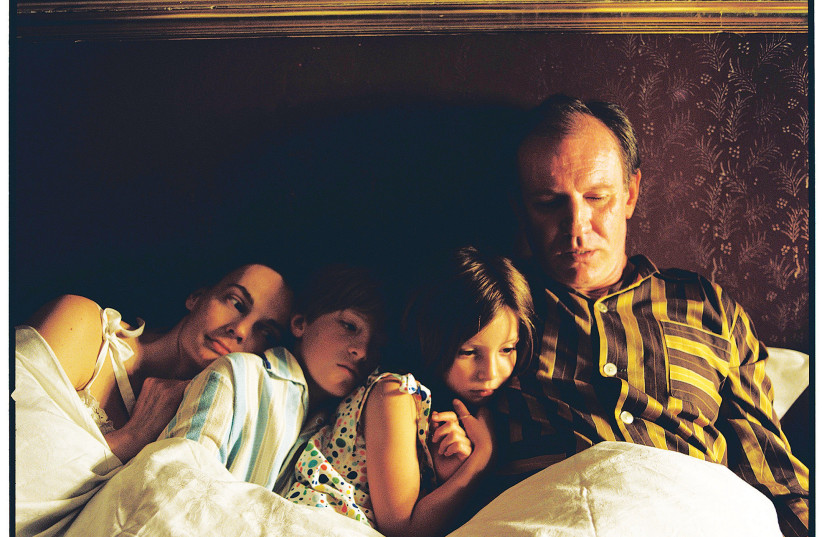How far would you go for your principles? That’s the key question that The Word, a movie by Czech director Beata Parkanova, a guest of the 38th Haifa International Film Festival, asks.
The Word, which won the award for Best Director at the prestigious Karlovy Vary Film Festival this year, as well as the Best Actor award for its star, Martin Finger, is a delightfully complex movie that tells the story of a seemingly ordinary family in a Czech town. The father, Vaclav (Finger), is a soft-spoken man, a bit of a dreamer, while his wife, Vera (Gabriela Mikulkova) is an intense, practical woman. They have two children, whom they love, but they are not particularly well suited to each other, although they do care for each other.
A couple like Vaclav and Vera would not likely be the subject of a movie but the film is set in 1968, the year of the Soviet invasion and the subsequent crackdown on freedom in what was then Czechoslovakia.
Vaclav, a respected and sought-after notary (a profession that, as the film presents, is like a combination of what we know as a lawyer and a notary, and involves much more than stamping documents), is pressured to join the Communist Party and to sign a statement approving of the repression of freedom by forces loyal to the Soviet authorities. He refuses both of these demands but instead of reveling in his defiance, he is struck by a deep depression that the more extroverted Vera cannot begin to understand.
Some of their closest friends and relatives have made the compromise and joined the party. While Vaclav does not condemn them, he cannot do what they have done. His words matter to him – he is a wise authority figure to the clients he counsels – and the bulk of the movie chronicles Vaclav and Vera’s attempts to move forward together, as they face the consequences of his refusal and his depression.

Sitting in the garden beside the Haifa Cinematheque, Parkanova spoke about the film through an interpreter – she understands a good deal of English but wanted to be sure she would be able to express herself precisely.
Vera and Vaclav “were based on my grandparents,” she explained. “The character of their daughter is based on my mother.” Her mother and grandfather were notaries and the film is very precise about the details of this kind of work.
<br>A story of Soviet repression
The story of how people coped with the Soviet repression in the late 1960s is part of the life of every Czech family, she said, but she feels it has a universal appeal. When the film premiered at the Karlovy Vary Film Festival, some Czech viewers predicted people abroad would not understand it but she said she is thankful that this has not been the case when she has taken the movie to film festivals around the world.
“IT IS a specific story of a time period but any family in any country can experience a situation that is changed from outside by something you didn’t expect,” she said. “The audience loved our film at the screening yesterday, The Word speaks with people from countries around the world.”
The story in the film draws them in because they can relate to the characters, she said.
“I wish to create characters that are not good or bad but more ambiguous. Overall, I wish to present the questions for the viewers to ask for themselves rather than give the answers... In the film, you don’t necessarily have to understand why they are they are doing what they are doing but you have to feel.”
These multi-layered characters feel so real because of this ambiguity. Parkanova refuses to create conventional heroes and villains.
“I worked with the idea that there’s always a trade-off, a back and forth, between these characters. She’s a strong person who is holding the family together but she is not always a saint... Everything that happens among this family is more emotional than rational but the family works together even though they have different views.”
Vaclav undergoes a kind of hero’s journey as he remains steadfast, knowing his decision will have major repercussions for his family. “He’s a humanized hero,” she said.
Parkanova, who is currently finishing work on her next movie about a six-year-old girl who experiences trauma, takes her work very seriously and rehearses her actors for years before she begins shooting. “It takes time,” she said. The actors become her partners in developing the characters, even giving input into the costumes they wear.
She feels that this rigorous approach pays off and is glad that The Word is finding an audience. The movie is especially timely now, she said, because, as people watch the news, they inevitably think, “What does it mean for Russians in a totalitarian country or people in Ukraine who are losing everything to be ready to speak out?” The Word gives deep insight into these questions.
The Haifa International Film Festival runs until October 17 at the Haifa Cinematheque and other theaters around the city.
